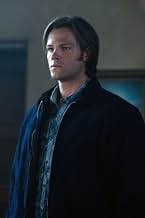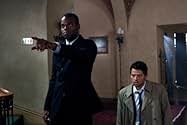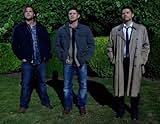The Third Man
- Episode aired Oct 8, 2010
- TV-14
- 41m
IMDb RATING
8.1/10
4.7K
YOUR RATING
When three policemen are struck down by the plagues of Moses, the brothers investigate, calling upon Castiel. He reluctantly appears,explaining that the murders are caused by the Staff of Mo... Read allWhen three policemen are struck down by the plagues of Moses, the brothers investigate, calling upon Castiel. He reluctantly appears,explaining that the murders are caused by the Staff of Moses and that there's a civil war in Heaven.When three policemen are struck down by the plagues of Moses, the brothers investigate, calling upon Castiel. He reluctantly appears,explaining that the murders are caused by the Staff of Moses and that there's a civil war in Heaven.
8.14.6K
1
2
3
4
5
6
7
8
9
10
Featured reviews
The Messy Return of the Angels
Sam calls Dean and asks him to head to Easter, Pennsylvania, to investigate the mysterious and gore death of two police officers. They visit the police officer Toby Grey that had witnessed the death of his partner and they learn that the three police officers had killed a teenager and planted a gun to justify their action. Then Toby dies in front of the Winchester brothers. They summon Castiel and they learn that the police officers were killed by Moses' staff. Further, Castiel tells that Heaven is chaotic and several lethal weapons have been stolen.
They visit the family of the deceased teenager and they discover that his little brother has sold his soul to an angel; in return, he received part of the staff that he used to kill the officers. Further Castiel discovers the identity of the responsible for the tragedy.
"The Third Man" is a terrible episode of Supernatural, with the messy return of the angels. The story has a promising bloody beginning but the development and mainly the conclusion is dull. My vote is four.
Title (Brazil): "O Terceiro Homem" ("The Third Man")
They visit the family of the deceased teenager and they discover that his little brother has sold his soul to an angel; in return, he received part of the staff that he used to kill the officers. Further Castiel discovers the identity of the responsible for the tragedy.
"The Third Man" is a terrible episode of Supernatural, with the messy return of the angels. The story has a promising bloody beginning but the development and mainly the conclusion is dull. My vote is four.
Title (Brazil): "O Terceiro Homem" ("The Third Man")
"The Third Man" is a richly layered episode that combines biblical mythology with character-driven storytelling
"The Third Man," the third episode of Supernatural's sixth season, directed by Robert Singer and written by Ben Edlund, is a compelling installment that expertly blends biblical mythology with character-driven drama. As Sam (Jared Padalecki) and Dean Winchester (Jensen Ackles) investigate a series of gruesome murders involving the plagues of Egypt, the episode introduces new layers to the celestial conflict in Heaven while deepening the mystery surrounding Sam's return from Hell. With its intricate narrative and strong performances, "The Third Man" sets the stage for larger thematic explorations in the season.
The episode begins with Dean adjusting to life on the road after leaving Lisa (Cindy Sampson) and Ben (Nicholas Elia) behind, while Sam pulls him into a case involving police officers dying under supernatural circumstances. The deaths-boils, blood-filled water, and locusts-are revealed to mirror the biblical plagues of Egypt, hinting at angelic involvement. Dean's prayer summons Castiel (Misha Collins), who confirms that weapons stolen from Heaven are being used to exact vengeance. This revelation propels the trio into a morally complex investigation that uncovers a grieving father and his son, Aaron, who traded his soul for part of the Staff of Moses to avenge his brother's killers.
Robert Singer's direction effectively balances suspenseful action with quieter moments of introspection. The cinematography enhances the eerie tone of the episode, particularly in scenes depicting the plagues' aftermaths and Castiel's confrontations with rogue angels. The use of dim lighting in Aaron's home underscores the tension as Castiel interrogates him-a scene that is both emotionally charged and unsettling due to Castiel's cold pragmatism. While the pacing generally flows well, some critics have noted that transitions between investigative scenes and celestial conflicts feel slightly rushed, leaving certain plot points underexplored.
The performances are a standout element of "The Third Man." Jensen Ackles delivers a nuanced portrayal of Dean as he grapples with his discomfort over Castiel's methods and his growing suspicion about Sam's behavior. Jared Padalecki imbues Sam with an unsettling detachment, particularly during moments where he condones Castiel's torture of Aaron-a decision that shocks Dean and hints at deeper changes in Sam's character since his resurrection. Misha Collins shines as Castiel, blending humor with gravitas as he reveals Heaven's internal strife and his own role in opposing Raphael (Demore Barnes). Sebastian Roché's debut as Balthazar adds intrigue to the celestial narrative, showcasing a morally ambiguous angel who challenges traditional notions of loyalty.
"The Third Man" delves into questions of morality, sacrifice, and power dynamics within celestial hierarchies. Aaron's decision to trade his soul for vengeance mirrors broader debates about justice versus retribution, while Castiel's willingness to torture a child highlights the ethical compromises made during war. The episode also explores free will versus predestination through Raphael's desire to restart the apocalypse-a stark reminder of how divine plans can clash with human agency. These themes resonate deeply within Supernatural's broader narrative about familial bonds and moral ambiguity.
One of the most striking moments occurs when Raphael brutally confronts Castiel, revealing his ambition to rule Heaven and restart Lucifer's apocalyptic plan. This sequence not only heightens the stakes but also underscores Castiel's vulnerability as he struggles against overwhelming odds. Balthazar's intervention adds complexity to the celestial conflict by introducing rogue elements within angelic ranks, further complicating Castiel's mission. Meanwhile, Dean and Sam's confrontation over Aaron's torture serves as a poignant reminder of their differing moral compasses-a tension that continues to build throughout Season 6.
"The Third Man" is a richly layered episode that combines biblical mythology with character-driven storytelling. Its exploration of moral dilemmas and celestial politics adds depth to Supernatural's overarching narrative while setting up key conflicts for future episodes. While some aspects-such as Balthazar's motivations-could have been more fully developed, strong performances and thematic resonance make this installment a standout in Season 6. By intertwining cosmic stakes with personal struggles, "The Third Man" challenges viewers to reflect on their own beliefs about justice and loyalty in times of crisis.
The episode begins with Dean adjusting to life on the road after leaving Lisa (Cindy Sampson) and Ben (Nicholas Elia) behind, while Sam pulls him into a case involving police officers dying under supernatural circumstances. The deaths-boils, blood-filled water, and locusts-are revealed to mirror the biblical plagues of Egypt, hinting at angelic involvement. Dean's prayer summons Castiel (Misha Collins), who confirms that weapons stolen from Heaven are being used to exact vengeance. This revelation propels the trio into a morally complex investigation that uncovers a grieving father and his son, Aaron, who traded his soul for part of the Staff of Moses to avenge his brother's killers.
Robert Singer's direction effectively balances suspenseful action with quieter moments of introspection. The cinematography enhances the eerie tone of the episode, particularly in scenes depicting the plagues' aftermaths and Castiel's confrontations with rogue angels. The use of dim lighting in Aaron's home underscores the tension as Castiel interrogates him-a scene that is both emotionally charged and unsettling due to Castiel's cold pragmatism. While the pacing generally flows well, some critics have noted that transitions between investigative scenes and celestial conflicts feel slightly rushed, leaving certain plot points underexplored.
The performances are a standout element of "The Third Man." Jensen Ackles delivers a nuanced portrayal of Dean as he grapples with his discomfort over Castiel's methods and his growing suspicion about Sam's behavior. Jared Padalecki imbues Sam with an unsettling detachment, particularly during moments where he condones Castiel's torture of Aaron-a decision that shocks Dean and hints at deeper changes in Sam's character since his resurrection. Misha Collins shines as Castiel, blending humor with gravitas as he reveals Heaven's internal strife and his own role in opposing Raphael (Demore Barnes). Sebastian Roché's debut as Balthazar adds intrigue to the celestial narrative, showcasing a morally ambiguous angel who challenges traditional notions of loyalty.
"The Third Man" delves into questions of morality, sacrifice, and power dynamics within celestial hierarchies. Aaron's decision to trade his soul for vengeance mirrors broader debates about justice versus retribution, while Castiel's willingness to torture a child highlights the ethical compromises made during war. The episode also explores free will versus predestination through Raphael's desire to restart the apocalypse-a stark reminder of how divine plans can clash with human agency. These themes resonate deeply within Supernatural's broader narrative about familial bonds and moral ambiguity.
One of the most striking moments occurs when Raphael brutally confronts Castiel, revealing his ambition to rule Heaven and restart Lucifer's apocalyptic plan. This sequence not only heightens the stakes but also underscores Castiel's vulnerability as he struggles against overwhelming odds. Balthazar's intervention adds complexity to the celestial conflict by introducing rogue elements within angelic ranks, further complicating Castiel's mission. Meanwhile, Dean and Sam's confrontation over Aaron's torture serves as a poignant reminder of their differing moral compasses-a tension that continues to build throughout Season 6.
"The Third Man" is a richly layered episode that combines biblical mythology with character-driven storytelling. Its exploration of moral dilemmas and celestial politics adds depth to Supernatural's overarching narrative while setting up key conflicts for future episodes. While some aspects-such as Balthazar's motivations-could have been more fully developed, strong performances and thematic resonance make this installment a standout in Season 6. By intertwining cosmic stakes with personal struggles, "The Third Man" challenges viewers to reflect on their own beliefs about justice and loyalty in times of crisis.
Awful second half
So here's what's wrong with this episode, and what will eventually kill the series. We start off with a bang as three police officers die incredibly gory deaths. Turns out someone has put a hex on the three, and Sam and Dean are in town to check things out. So far, so good. The hex is caused by misuse of Moses' staff, which has been stolen by an angel, and Sam and Dean must retrieve the staff just as if they were in an episode of Warehouse 13 or Friday the 13th - The TV series. From there, it's all downhill, as we find out is heaven is still at war. The rest of the episode is dull stuff with Castiel (who was OK for a story arc but not as a recurring character) has words with some other angels, and fights breakout. Dull, dull, dull. The thing that killed GHOST WHISPERER was an increasingly maudlin tone and the overuse of Hewitt's real-life beau in a recurring role as a college prof. The poor guy couldn't act his way out of a paper bag, and this plus the maudlin stuff eventually did in GW. The overuse of heavenly wars, and Castiel himself will kill SUPERNATURAL. But then, the show has been on for six seasons. And as much as I'd like to see it go another six, the writers have hit bottom for plots. We watched THE X-FILEs die a painful death in its last two or three seasons. Now we apparently have to witness the same for SUPERNATURAL. It is a real shame.
A civil war in Heaven
No matter how many times I see this episode, I still can't figure out how I truly feel about. I don't hate it but I'm not crazy about either.
Cas is back, he got the chance to deliver some funny moments and Sam's car is gone. The Charger was cool but she had to go. The brotherly teasing is always fun to watch. Dean is still a family man and it's good the brothers are working together again. Also we got to see some gory deaths again like good old Supernatural days. So what's wrong? Why can't I like it?
The Heavenly civil war is a stupid idea and the whole stolen Heavenly weapons story doesn't work for me. And the show seems to be inconsistent to me right now. First it's the Djinn and the Sam and Samuel resurrection, then it's the alpha shape shifter and now it's the war in Heaven. And what's the deal with angels buying human souls?
Sebastian Roché is charming as Balthazar, showing a new version of Angels. He is neither a dick like Zach and Uriel or nerd like Cas.
Finally, What's wrong with Sam? An episode after the other, he seems more and more remote and cold, and I wonder if he is really Sam or is it his way with dealing with his Hell experience, We have seen Robo Sam before on "Mystery Spot" may be it's the same attitude. But this is not our Sam, Sam would never hire a prostitute (he made that clear on "Lazarus rising"), Sam would never be OK with torturing a kid. And though I liked it when Sam stepped out and took the lead before but now he is too bossy and annoying.
Cas is back, he got the chance to deliver some funny moments and Sam's car is gone. The Charger was cool but she had to go. The brotherly teasing is always fun to watch. Dean is still a family man and it's good the brothers are working together again. Also we got to see some gory deaths again like good old Supernatural days. So what's wrong? Why can't I like it?
The Heavenly civil war is a stupid idea and the whole stolen Heavenly weapons story doesn't work for me. And the show seems to be inconsistent to me right now. First it's the Djinn and the Sam and Samuel resurrection, then it's the alpha shape shifter and now it's the war in Heaven. And what's the deal with angels buying human souls?
Sebastian Roché is charming as Balthazar, showing a new version of Angels. He is neither a dick like Zach and Uriel or nerd like Cas.
Finally, What's wrong with Sam? An episode after the other, he seems more and more remote and cold, and I wonder if he is really Sam or is it his way with dealing with his Hell experience, We have seen Robo Sam before on "Mystery Spot" may be it's the same attitude. But this is not our Sam, Sam would never hire a prostitute (he made that clear on "Lazarus rising"), Sam would never be OK with torturing a kid. And though I liked it when Sam stepped out and took the lead before but now he is too bossy and annoying.
The Cas side of the season never worked, and always felt rushed
The heaven plotlines-the excuses the show made up to depower Cas -never really worked. Even in season 4 and 5 it was a weak point. In this case Cas is way to starkly different from his prior appearance-he tortures a kid!-and the various factions angels are really left unexplained. This episode feels ultimately like treading water. Future episodes help put it in proper context but it is ultimately to little to late.
Add in the episode aping Black Lives Matter for social color and it all feels cheap and ill-planned.
Add in the episode aping Black Lives Matter for social color and it all feels cheap and ill-planned.
Did you know
- TriviaAt 08.21, when the boys first enter the morgue, the doctor/forensic pathologist in the room is Robert Singer, the director of this and several other Supernatural episodes.
- GoofsWhen Castiel jumps through the window with the other angel, a black-and-white backdrop of a skyscraper is seen outside through the window. A few moments later, when Sam and Dean look outside, trees and a condominium building at the filming location appear instead. After the commercial break, the black-and-white backdrop returns.
- ConnectionsReferences The Third Man (1949)
- SoundtracksEnd Credits Theme
Composed by Jay Gruska
Details
Contribute to this page
Suggest an edit or add missing content






















